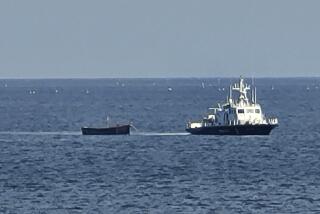Vietnamese Stowaways Reach a Happy Landing : Immigration: Five countries had denied the four young men asylum. They are in the United States on a ‘humanitarian parole.’
Four young men without a country got an early Christmas present Saturday--a new home in America, at least temporarily.
The Vietnamese had stowed away on the Greek cargo ship Silver Ibex and spent the last four months at sea while a succession of nations refused them entry.
But Saturday morning, they left the ship that had been their home--and the Greek skipper who had become almost a father to them--and were met at the Port of Long Beach by members of the Vietnamese-American community from the city of Orange.
“This is a great Christmas gift from God,” said Dinhluu Nha, publisher of the Sunday Tribune, a Westminster-based Vietnamese publication. The new arrivals, ranging in age from 15 to 21, waved and smiled as they debarked from a small boat that brought them to shore.
“They are very happy,” said Dr. Nguyen Ngoc Ky, a family practitioner who translated for them in an interview. “They say they could not live under the dictatorship of communism.”
Three of their companions never made it as far as Long Beach. The Vietnamese-Americans who have agreed to sponsor the new arrivals said the missing men jumped ship Dec. 9 in Japan and tried to swim ashore. Nha said two bodies were later found and one was not recovered.
Ky said the captain of the Greek vessel, Anargiros Kondilis, had become hopeless over the plight of the men after they were refused entry in Japan and began to sail off for Peru when the three jumped overboard at night.
According to Vietnamese-Americans who met the ship Saturday, at least five countries turned down the request for asylum before the United Nations’ High Commissioner on Refugees appealed to the United States for help.
The United States allowed the men to enter the country under a “humanitarian parole,” a provision under which they may live here temporarily while their case is being reviewed by the U.S. Immigration and Naturalization Service. The INS must determine if they qualify for permanent resident status.
The four Vietnamese were identified as Muoi Van Vo, 21, a baker by trade; Nguyen Van Cuong, 18, a fisherman; Nguyen Van Son, 15, also a fisherman; and Ngo Van Diep, 21, a carpenter.
All seven of the Vietnamese boarded the Silver Ibex on Aug. 9, while it was docked at Ho Chi Minh City (formerly Saigon), where all lived. Ky, the physician, said some slipped aboard by climbing down the smokestack of the vessel, while others hauled themselves up the line that holds the anchor.
They were discovered several days later and locked in a room, but said they were treated well by the captain, who took a personal interest in helping to find them a safe haven. He fed them and provided clothes during the months at sea.
“They want to accept the captain as their father,” said the physician.
The Vietnamese-Americans said that despite the captain’s efforts, the men were denied entry in Singapore, India, Thailand, South Korea and Japan.
The rejection by the Japanese was the final blow for three of the men, who took a desperate gamble. At night, as the ship was leaving Japan, they attempted to swim to the mainland.
It was after that incident that the U.N. commissioner became involved, making his appeal to the United States. Also involved in the effort to bring the men to America was Catholic Charities. Nha said he was contacted Thursday night and offered to help sponsor the men.
“I felt very lonely” under that burden, he said. But then he began calling other Vietnamese-Americans at La Purisima Catholic Church in Orange and found unanimous support and offers of help.
The church, whose congregation includes 700 Vietnamese-Americans, was scheduled to welcome the new arrivals at Mass Saturday night. Nha said the four men will be staying at a motel in Garden Grove until an apartment can be found.
For the publisher, the new arrivals brought back memories of his own escape from Vietnam 15 years ago and the problems he had in adapting to life in the United States.
“It was pretty difficult at first,” he said. “The culture, the way of life.” But he predicted that after a year or so they will have made strides.
Asked what they would like to do or see in America, the physician, Ky, translated: “They would just like to go looking for freedom.”
More to Read
Sign up for Essential California
The most important California stories and recommendations in your inbox every morning.
You may occasionally receive promotional content from the Los Angeles Times.










